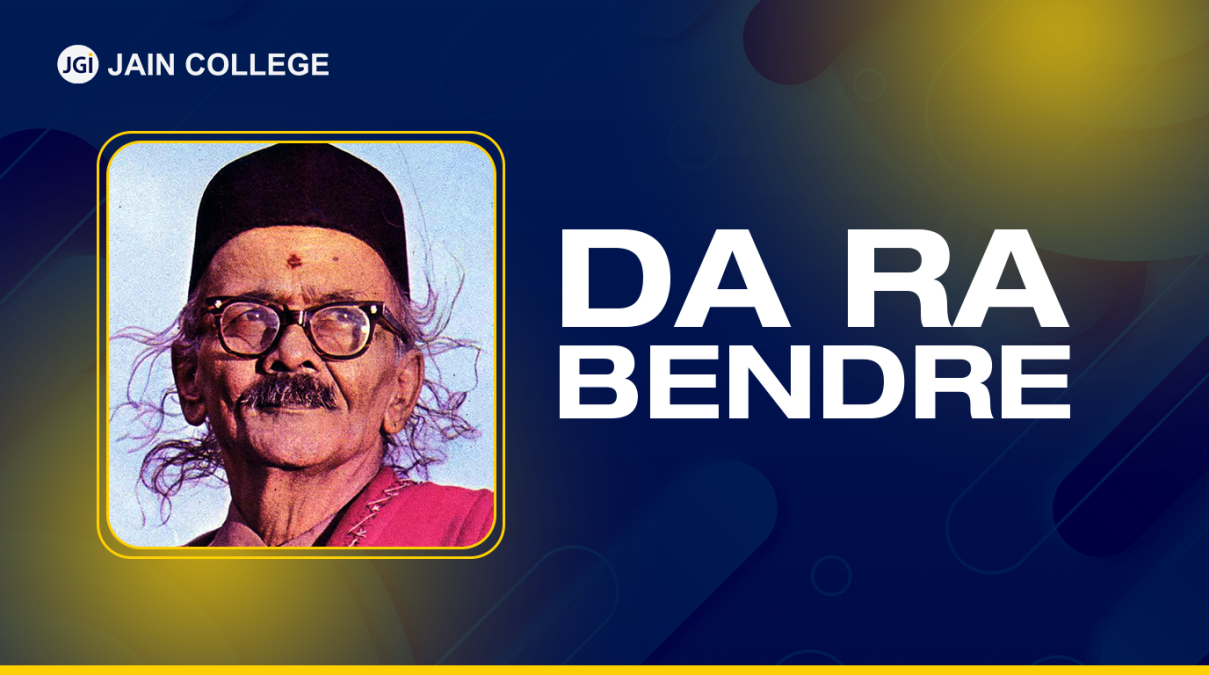
Dattatreya Ramachandra Bendre was a renowned poet, essayist, philosopher, and translator. He was popularly known as Da. Ra. Bendre.
Da Ra Bendre is generally considered the most renowned and eminent Kannada poet. Among the greatest Kannada poets ever, he was one of the most important figures in literature. Along with being a pioneering poet, Da Ra Bendre was an essayist, philosopher, and translator; he was a winner of the prestigious Jnanpith Award and is considered one of Karnataka’s greatest literary minds.
Da Ra Bendre is one of the eight recipients to win the Jnanpith/Jnanapeeta Prashasti award. Bendre has a prominent place in Kannada literature as one of the greatest Kannada poets of the pre-Independence period.
Da Ra Bendre Chronology:
This section provides an overview of Da Ra Bendre's history along with a detailed timeline.
Dattatreya Ramachandra Bendre Chronology:
| Early Life | |
| Full Name | Dattatreya Ramachandra Bendre |
| Pen name | Ambikatanayadatta |
| Birth Date | 31 January 1896 |
| Birthplace | Dharwad, northwestern part of Karnataka, India |
| Nationality | Indian |
| Occupation | Poet and Teacher |
| Genre | Poetry |
| Literary movement | Navodaya |
| Died on | 26 October 1981 (age 85 years), Mumbai |
| Family Details | |
| Parents | Ambavva Bendre and Ramachandra Bendre |
| Spouse | Lakshmibai (née Rangoobai) |
| Children | 3 |
| Education & Career | |
| Primary and high school education in Dharwad | |
| 1913 | Completed his matriculation |
| 1918 | Completed B.A. from Fergusson College, Pune |
| 1935 | Obtained an M.A. degree from Mumbai University |
| 1918 to 1932 | Worked Victoria High School in Dharwad and the National School in Dharwad, Gadag, and Hubli |
| 1932 | Bendre was sentenced to imprisonment for writing Nara Bali (Human Sacrifice) |
| 1944 and 1956 | Worked as a professor of Kannada in D.A.V. College, Solapur |
| 1956 | Served as an advisor for All India Radio's station in Dharwad |
| Literary Contributions | |
Plays |
Tirukara Pidugu in 1930Nageya Hoge in 1931Ambikatanayadatta Nataka Samputa (1982) |
| Story collections | Niraabharana Sundari in 1940 |
| Poetry collections | Krishṇakumaari in 1922Uyyaale (1938)Naadaleele (1938) |
| Works in other languages | A Theory of Immortality in 1977 |
| Recognition and Awards | |
| 1943 | President of the 27th Kannada Sahitya Sammelana held in Shimoga |
| 1958 | The Sahitya Akademi Award |
| 1965 | The Kelkar Prize |
| 1968 | The Padma Shri award |
| 1968 | Fellowship of the Sahitya Akademi |
| 1973 | The Jnanpith/Jnanapeeta Prashasti award |
| Da Ra Bendre was praised as varakavi, literally 'gifted poet'In 1972, the Karnataka state published a biographical work on Bendre's life. | |
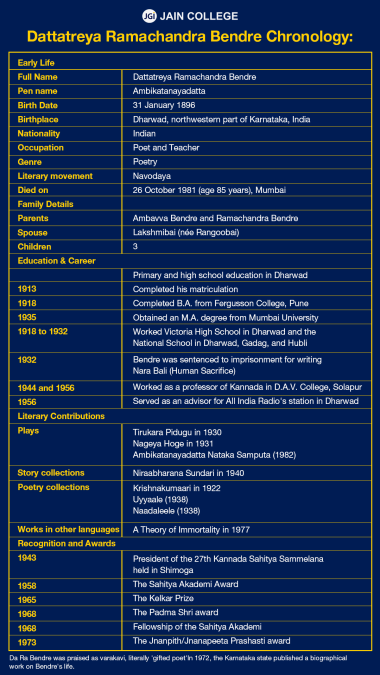
Dattatreya Ramachandra Bendre is a renowned poet of the Kannada modernist school, Navodaya. He was one of the eight recipients from Karnataka of the Jnanpith/Jnanapeeta Prashasti award.
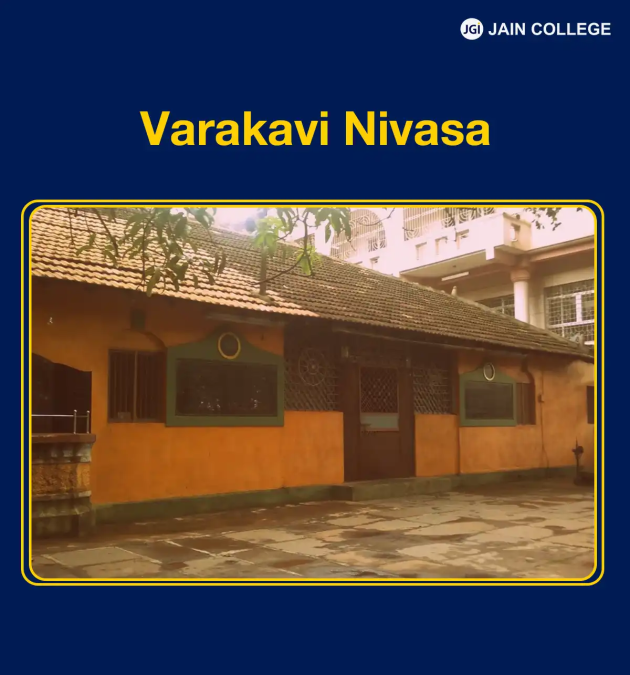
Da Ra Bendre, a renowned poet who changed the face of Kannada literature, was born on January 31, 1896, into a Brahmin family in Dharwad, a region in north Karnataka. He was the eldest son of Ramachandrabhatta and Parvatibai (whose name before marriage was Ambavva), who originally belonged to Kumbaru, a village in the Colaba district of Maharashtra.
The Bendre family produced several Vedic scholars.
Dattatreya was hardly 12 years old when his father died of scrofula. Thus, he was brought up by his mother, grandmother and great-grandmother, whom he adored.
Deprived of close contact with his paternal relations, he had a lifelong attachment to his mother, an inspiration to him throughout his life. In many of his poems, he celebrates both his mother's and grandmother's names.
In one of his poems called "Godalege Ba Godu He", he has completely recalled the incidents of his mother's being born to a manager in a village called "Talavayi".
Dattatreya adopted Ambikatanayadatta as his pen name, which means "son of Ambika Datta". He kept his pen name in honour of his mother, who owned and operated a khanavali, a family restaurant, to feed the family.
Da Ra Bendre married Lakshmibai, who was 10 years younger than him, in 1919 at the age of 23. Despite having nine children, the couple tragically lost six of them.
With the help of his uncle, Bendre completed both his school education (primary and high) in Dharwad. Later in 1913, he completed his matriculation. He joined Fergusson College, Pune, for his higher education. Following graduation, he returned to Dharwad and began his career as a teacher at Victoria High School. Later in 1935, he obtained his Master of Arts degree.
As a poet, Da Ra Bendre began writing simplistic and earthy romantic poems. Symbolism is characteristic of his poetry. He consistently employed diverse techniques for spiritual lyrics, including:
In one of his children's rhymes or poems, Patargitti, he describes the colours of temptation and how the children feel while watching butterflies.
In all his poems, Bendre used alliteration and music. However, only those with training in the art of poetry could decode the hidden meaning inherent in poetry. He often used folklore, vachanas, and Kirtans in his poems, which connect them to the Kannada poetic tradition.
Due to his profound understanding and masterful use of the Kannada language, Da Ra Bendre is considered a father figure of modern Kannada poetry. He is known for his revolutionary exploration of new poetic forms and his deep connection to folk traditions.
Da Ra Bendre has a prominent place in Kannada literature for romantic poetry. In addition to enriching Kannada poetry, his works explored spirituality or mystical themes. Some of his favourite subjects include love, the natural world, patriotism, compassion, and spiritual contemplation.
Da Ra Bendre was a pioneering poet in the Kannada Navōdaya movement. Along with Kuvempu, V. K. Gokak, Masti Venkatesh Iyengar and others, he was a pivotal figure in the Navodaya movement in 20th-century Kannada literature, a period of linguistic and literary renaissance.
Also Read: Kuvempu: Karnataka’s Iconic Poet and Jnanpith Award Winner
As a poet, Da Ra Bendre began with an elementary and earthly form of romantic poetry, often using the "spoken" language. During his later years, he began to address social and philosophical issues with his work, leading Kannada critics to praise it.
Da Ra Bendre believed in the value of an integrated personality. However, he preferred to portray himself as a threefold being:
These three 'selves' were conceived as mutually supportive 'selves'
Da Ra Bendre has employed native prosodic forms, folk beliefs, indigenous imagery, references to Indian mythology, and the language spoken by common people.
Also Read: V.K.Gokak : Pioneer of Modern Kannada Poetry
Da Ra Bendre was one of the most notable Kannada poets of the Navodaya period. He was given the honorific Varakavi, which refers to the gifted poet. Later, most of Bendre's Kannada poems were translated into Hindi, Sanskrit, and other Indian languages, as well as the German language.
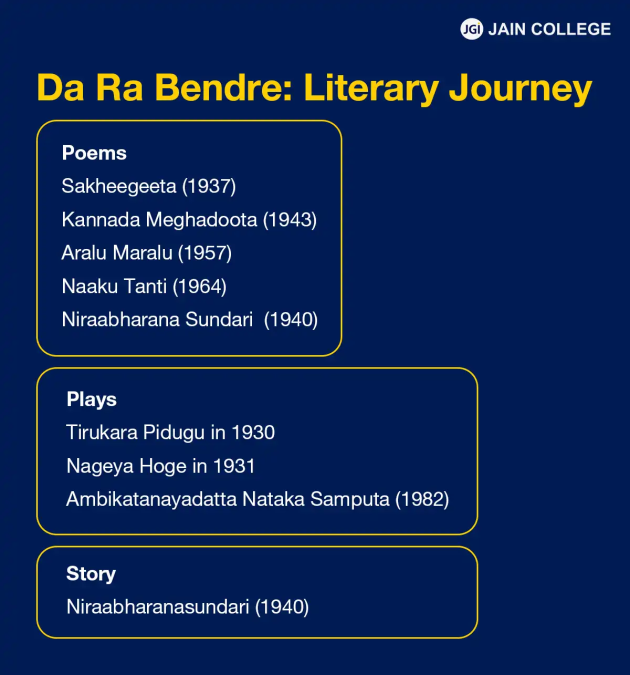
Da Ra Bendre published most of his poetry as "Ambikatanayadatta."
Some of his collections of poems include:
| 1922 | Krishṇakumaari |
| 1932 | Gari |
| 1938 | Uyyaale |
| 1938 | Naadaleele |
| 1943 | Meghadoota |
| 1946 | Haaḍu Paaḍu |
| 1951 | Gangaavataraṇa |
| 1956 | Sooryapaana |
| 1956 | Hrudaya Samudra |
| 1956 | Muktakantha |
| 1957 | Chaityaalaya |
| 1957 | Jeevalahari |
| 1957 | Araḷu Maraḷu |
| 1958 | Namana |
| 1959 | Sanchaya |
| 1960 | Uttaraayaṇa |
| 1961 | Mugila Mallige |
| 1962 | YakshaYakshi |
| 1964 | Naaku Tanti |
| 1966 | Maryaade |
| 1968 | Shrimaata |
| 1970 | Idu Nabhōvaaṇi |
| 1973 | Matte Shraavaṇa Bantu |
| 1978 | Chaturōkti |
| 1982 | Paraaki |
| 1982 | Kavyavaikhari |
| 1983 | Taa Lekkaniki Taa Dauti |
| 1983 | Baalabodhe |
| 1987 | Pratibimbagaḷu |
| 1990 | Shatamaana |
Some of his plays include:
| 1936 | Hucchatagalu: It has five one-act plays |
| 1940 | Nirabharan Sundari: Contains some of his literary essays, stories, and humorous songs. |
| 1950 | Hosa Samsara Mattu Itara Ekankagalu: It contains four plays. |
Also Read: Shivarama Karanth: Eminent Kannada Litterateur and Artist
In recognition of his contributions to Indian literature, Da Ra Bende received several prestigious awards and honours. Some of these awards and recognitions include:
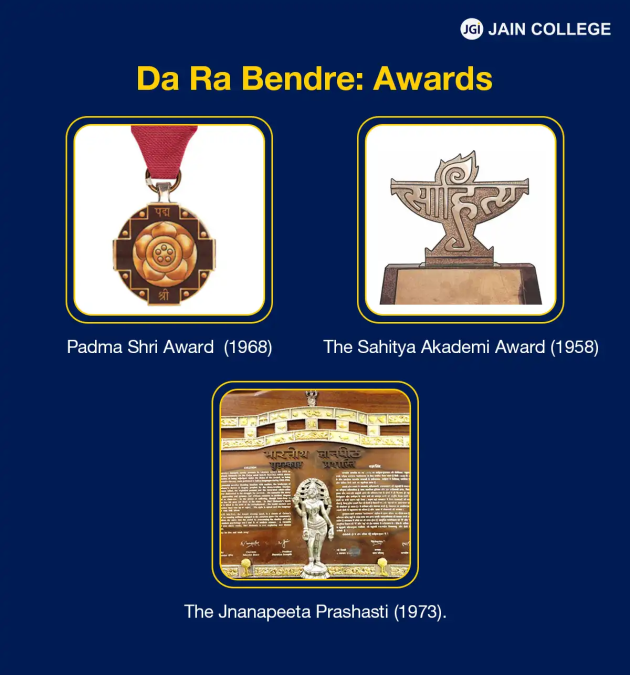
Da Ra Bende was an eminent Kannada poet and a winner of the prestigious Jnanpith/Jnanapeeta Prashasti award. In 1973, he received the Jnanapeeta Prashasti award for “Naaku Tanti”—a collection of his poetry.
The renowned writer of the century has been the recipient of many awards. Along with the Sahitya Akademi awards, here are some other awards and honours:
| 1958 | Sahitya Akademi Award |
| 1965 | N.C. Kelkar Award for Samvaad – A Marathi prose |
| 1965 | N.C. Kelkar Award for Vitthal Sampradaya – A Marathi prose |
| 1966 | Awarded an honorary doctorate by the University of Mysore |
| 1967 | Selected as a fellow of the Tattvachatushatai Academy |
| 1968 | Sahitya Academy fellowship |
| 1968 | Awarded an honorary doctorate by the University of Karnataka |
| 1968 | Received the Padma Shri, the fourth-highest civilian award, from the Government of India |
| 1980 | Kelkar Award for his Marathi prose titled Sant Mahantancha Purna Shambhu Vitthal |
| He also held the title ‘Karnataka kula Thilaka’ conferred by Udupi Adamaru Math. |
Also Read: Karnataka’s Iconic Poet and Jnanpith Award Winner
Da Ra Bendre is often regarded as the greatest Kannada lyric poet of the 20th century. His poetry is considered “eternally relevant” even today because it blends universal and philosophical themes with specific local contexts.
In many ways, his poetry embodies the Kannada language. In terms of Kannada literature, the poetry of Da Ra Bendre embodies the Kannada language in many ways.
The works of Bendre explore mysticism, which has enriched Kannada poetry. According to him, poetry is all about interpreting and describing familiar experiences in new ways and about exploring new areas of experience.
Da Ra Bendre was a visionary poet and playwright with a lasting impact on Kannada literature. His works still encourage and inspire writers and readers alike. He has left behind a legacy that will last for generations.
Stay tuned with JAIN PU College to learn more about Karnataka's famous literary authors and poets and the Jananpeeth award for the Kannada language.
Da Ra Bendre obtained his B.A. in 1918, and he completed his M.A. in 1935 at Mumbai University.
Ambikatanayadatta is the Indian pen name of Da Ra Bendre.
In 1932, Da Ra Bendre was imprisoned by the British colonial government for his poem, Nara Bali – Human Sacrifice. In his poem, he invoked the suffering of his motherland under foreign dominion and demanded its freedom.
Love, nature, social awareness, patriotism, and spiritual contemplation are some of Da Ra Bendre's favourite subjects.
Da Ra Bendre explored his relationship with the universe through his poetry by introspecting on the ideas emerging from it.
Naaku Tanti, a collection of 44 poems, won the Jnanpith Award in 1973 for the best work of Indian literature from 1962 to 1966.
In 1972, the Karnataka state published a biographical work on Bendre's life.
Da Ra Bendre's first published poem was Tutoori (Trumpet).
In this poem, the poet Da Ra Bendre poeticises his married life and describes his wife, Lakshmibai, as his Sakhee.

JAIN PU College, a part of the renowned JGI Group, is committed to empowering students with quality education.
Beyond academics, the college ensures its online content reflects the same standard of excellence. Every blog and article is meticulously vetted and proofread by subject matter experts to ensure accuracy, relevance, and clarity. From insightful educational topics to engaging discussions, JAIN PU College's content is crafted to inform, inspire, and add value to its readers, reflecting the institution's commitment to intellectual growth and innovation.
View all Blogs